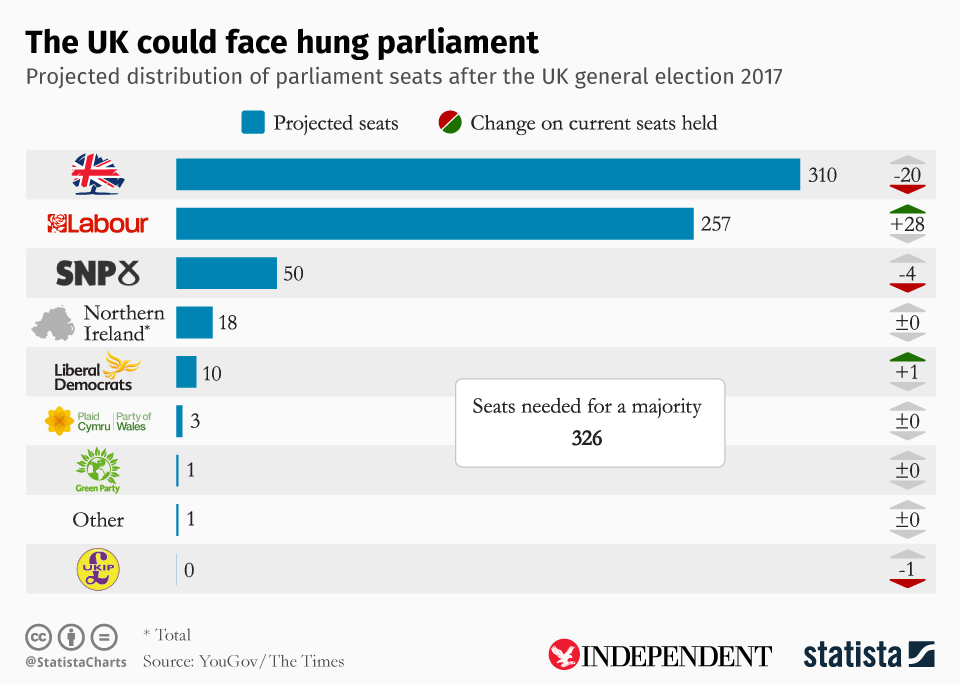Tories to fall short of outright majority and face hung parliament, new poll analysis predicts
YouGov predicts the Conservatives may win just 310 seats – 16 shy of an absolute majority
Your support helps us to tell the story
From reproductive rights to climate change to Big Tech, The Independent is on the ground when the story is developing. Whether it's investigating the financials of Elon Musk's pro-Trump PAC or producing our latest documentary, 'The A Word', which shines a light on the American women fighting for reproductive rights, we know how important it is to parse out the facts from the messaging.
At such a critical moment in US history, we need reporters on the ground. Your donation allows us to keep sending journalists to speak to both sides of the story.
The Independent is trusted by Americans across the entire political spectrum. And unlike many other quality news outlets, we choose not to lock Americans out of our reporting and analysis with paywalls. We believe quality journalism should be available to everyone, paid for by those who can afford it.
Your support makes all the difference.Britain could be on course for a hung parliament in nine days’ time, according to a new projection that suggests the Conservatives could fall 16 seats short of an overall majority.
The seat-by-seat prediction by YouGov for The Times suggests that the Conservatives are on course to win 310 seats at the election – short of an absolute majority of 326 seats needed to form a Government.
Such a result on 9 June would be calamitous for Theresa May, who called the snap election in April, claiming the country needed certainty, stability and strong leadership as it enters the negotiations to exit the European Union on 19 June.
Ed Miliband, the former Labour leader, who suffered a disastrous result at the 2015 election despite predictions of a hung parliament, replied to the research on Twitter, adding: “The pollsters have been off my Christmas card since 2015 #justsaying”.
The Prime Minister would undoubtedly face questions over her leadership if the modelling by YouGov is proved to be accurate in just over a week, especially after she was forced into a humiliating U-turn over a proposed social care reformed dubbed the “dementia tax” by critics.
It also claims Jeremy Corbyn’s Labour party could be in line to gain 29 seats on the last election with 257, with the Liberal Democrats on 10 and the SNP down four seats on 50.
Such a result would mean the Labour leader would have to be willing to enter negotiations with other political parties if he wished to enter Downing Street.
But Mr Corbyn has unequivocally ruled out a coalition deal with Nicola Sturgeon’s SNP and Tim Farron, the Liberal Democrat leader, said in April that he will do “no deal, no deal with anybody” under any circumstances – unlike his predecessor Nick Clegg.
The SNP, which is forecast to win 50 seats, would be the only party with enough seats to prop the party up in Government but is unlikely to as it opposes Brexit and much of the Tory platform.
Ms Sturgeon previously said that she would be willing to enter a “progressive alliance” with Labour but did not “want a Tory Prime Minister or Tory government”.
Despite the surprise prediction by YouGov, however, other polls have consistently provided Ms May’s party with a commanding lead.
An ICM poll for the Guardian on Tuesday showed Labour gaining ground – a trend consistent with other pollsters – but suggested the Tories are still enjoying a healthy advantage.
It placed Ms May on 45 per cent, Labour on 33 per cent, the Lib Dems on 8 per cent and Ukip on 5 per cent.
The latest model, which has been met with scepticism by both the Conservatives and Labour, was based on 50,000 interviews over the course of a week with voters brought in to form a panel.
The pollsters assessed the intentions of every type of voter, including where they live to how they voted in the EU referendum, their age and their social backgrounds.
They then used data from the Office of National Statistics, the British Election study and past election results and estimated estimated the number of each type of voter in each constituency.

Combining the model probabilities and estimated census counts, YouGov predicted who was likely to win each constituency to give the results pictured in the infographic above, created for The Independent by the statistics agency Statista.
But the firm also allowed itself a huge margin for error, following weeks of polls showing a strong Tory lead amid widespread predictions of a landslide.
It suggests the Tories could get as many as 345 seats on a good night but as few as 274 on a bad night.
Andrew Hawkins, the chairman of ComRes, told The Times: “If voters behave in the way they broadly did in 2015 then the Conservatives remain on track for a 100-plus majority. This seems, on present assumptions, the most likely outcome.”
But the polls have been narrowing in recent weeks as Ms May was forced into an embarrassing U-turn over a proposed social care reform plan dubbed the “dementia tax”.
Under plans published in the manifesto, the Tories proposed allowing elderly people who need social care to hold off paying for it until after their deaths so they do not need to leave their home.
But after intense criticism Ms May announced their would be a cap on the amount people were expected to pay so they could still leave something to their children.
She was then laughed at during the Sky News/Channel 4 leaders debate when Jeremy Paxman suggested she would not be taken seriously in Brussels.

Join our commenting forum
Join thought-provoking conversations, follow other Independent readers and see their replies
Comments